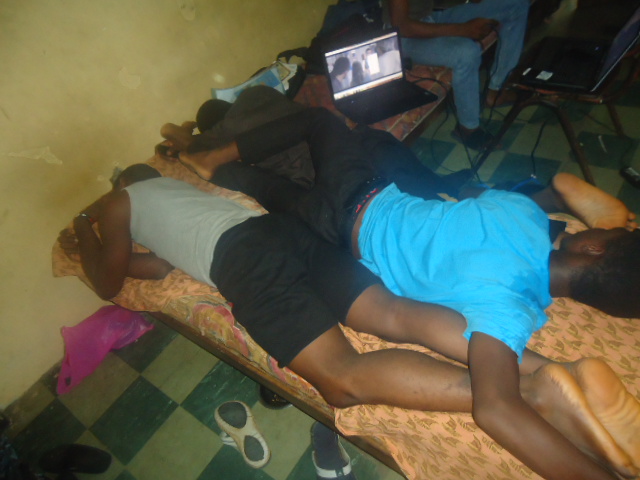“Accommodation crisis for students on campus”
October 6 School dormitories provide a comfort zone where students carry out most of their co-curricular activities. But Oluwafemi Ogunjobi, 20, a Correspondent from Gbongan, Nigeria, says underneath the sweet spirit of life away from home can lurk the hazards of squatting.
School dormitories provide a comfort zone where students carry out most of their co-curricular activities. But Oluwafemi Ogunjobi, 20, a Correspondent from Gbongan, Nigeria, says underneath the sweet spirit of life away from home can lurk the hazards of squatting.
Squatting is common in Nigeria’s institutions of higher education, and on many campuses is fast becoming a way of life.
Though it is against school regulations, students who cannot afford accommodation on campuses squat with their friends. Most of the problem is the inability of school management to provide adequate halls of residence for students, though the high cost of accommodation and deliberate circumvention of bed spaces allocation rules by students are also factors.
Squatting prevails at Obafemi Awolowo University, Ile-Ife, Nigeria. Whenever an academic session begins, students are worried over accommodation. Arguments develop between hostel managers and prospective occupants of the halls of residence. Students believe that bed spaces available in OAU’s hostels can only accommodate 30 per cent of the student population.
Gbadegesin Musibau, who declined to mention his department, said right from the first year he had no accommodation allocated to him. That development drove him to stay outside the campus while in 200 level.
“I decided to squat with a friend in Mayfair area (the University’s host community), while in Part II and I witnessed hell in terms of transportation problems and the kind of bad boys staying in my area. There were so many non-students whose business was to engage in vices. We always lived in fear and I didn’t enjoy myself until I moved back to campus,” Musibau explained.
According to statistics released by Dr Adesina, the Vice Dean of University’s Students’ Affairs, 3,417 bed spaces in Fajuyi, Moremi, Awolowo, Education Trust Fund and Akintola halls are reserved for 5,241 final year students for the 2012/2013 Academic Session.
In an online interview, Dr Adesina said OAU could not accommodate all 5,400 freshers. He said there are less than 9,600 bed spaces in the school – not enough to accommodate all its students.
“Yet, will we still accommodate other categories of students. The freshmen have been told that bed space allocations are on first-come-serve basis, ” Dr Adesina said.
Some of the students, who wanted privacy and convenience, paid higher to rent apartments in the university’s host community. The lucky ones said they would not accommodate squatters.
In Awolowo and Fajuyi Halls, legal occupants dare not report squatters, as instructed by the management; rather, they create spaces for their hosts.
Some students with relatives on campus squat together. Here, squatters have the “right” to sleep on the legal occupants’ bed spaces.
However, this is not the case in Angola and Mozambique halls, where the freshers are accommodated. Squatting is not rampant in these halls.
In OAU, illegal occupants have a club. They can even invite their squat-mate to join them illegally.
Jamiu Adewole, 400-Level English, said: “I stayed in the freshers’ hall in my Part One. I had a squatter that could not get accommodation because he resumed late. In my 200-Level days, I bought a bed space from a senior colleague, but in my 300-Level, I joined the squatters’ club.”
“It takes me nothing to squat someone, so far the person lives a normal life. Besides, life does not end here; we can still meet in future,” Adewole concluded.
Students who could not meet the financial challenges attached to accommodation sleep in lecture theatres, Association and Fellowship Secretariats, and common rooms. They retire to their hostels very early in the morning to get dressed for the day’s hassles.
“I started to squat from my first year on campus. In fact, I slept in the common room for some weeks before I got hooked with a colleague. It was like this till my penultimate year that a senior colleague gave me his bed space free of charge. This was when I could say I had a bed space to myself,” Moses Oluwanifise said.
A 100-Level female student, who preferred anonymity, explained: “The situation on campus is so bad that even freshers do not have bed spaces to themselves. I do not have issues squatting because life is meant to be enjoyed by all. Who knows, I might have been their shoes.”
To avoid financial challenges, many students remain on campus, refusing to leave their rooms when they are reallocated to new occupants. The result is that a room meant for six to eight students is congested with not less than sixteen students occupying it. The students still cook in the room, making them prone to danger.
The majority of the students who have to stay off campus contend with irregular power supply and insecurity. Some students therefore have resorted to squatting.
According to the university management, the development will persist as long as the government does not vote more funds for construction of hostels.
Meanwhile, it is an offence in the university to squat or be squatted. Buying many bed spaces in order to re-sell at an exorbitant price is also a crime.
To deter students, management punished some students who engage in selling spaces at exorbitant price. But will the punishment deter students from squatting or being squatted?
…………………………………………………………………………………………………
About me: I am a purpose-driven Nigerian, student, freelance writer, and youth development advocate. I am continuously involved in productive activities that affect human lives, purpose and dignity.
I am passionate about writing. I seek to bring global headliners together through it, and equally to demonstrate how passionate commitment to excellent reporting and storytelling makes a difference in the lives of people everywhere. I also love travelling and playing soccer.
…………………………………………………………………………………………………
Opinions expressed in this article are those of the author and do not necessarily represent the views of the Commonwealth Youth Programme. Articles are published in a spirit of dialogue, respect and understanding. If you disagree, why not submit a response?
To learn more about becoming a Commonwealth Correspondent please visit:
http://www.yourcommonwealth.org/submit-articles/commonwealthcorrespondents/
…………………………………………………………………………………………………




